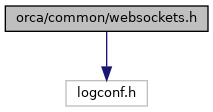File containing internal functions and datatypes for WebSockets client. More...
#include "logconf.h"

Go to the source code of this file.
Classes | |
| struct | ws_callbacks |
Enumerations | |
| enum | ws_status { WS_DISCONNECTED = 0, WS_CONNECTED, WS_DISCONNECTING, WS_CONNECTING } |
| The WebSockets client status. More... | |
| enum | ws_user_cmd { WS_USER_CMD_NONE, WS_USER_CMD_EXIT } |
| enum | ws_close_reason { WS_CLOSE_REASON_NORMAL = 1000, WS_CLOSE_REASON_GOING_AWAY = 1001, WS_CLOSE_REASON_PROTOCOL_ERROR = 1002, WS_CLOSE_REASON_UNEXPECTED_DATA = 1003, WS_CLOSE_REASON_NO_REASON = 1005, WS_CLOSE_REASON_ABRUPTLY = 1006, WS_CLOSE_REASON_INCONSISTENT_DATA = 1007, WS_CLOSE_REASON_POLICY_VIOLATION = 1008, WS_CLOSE_REASON_TOO_BIG = 1009, WS_CLOSE_REASON_MISSING_EXTENSION = 1010, WS_CLOSE_REASON_SERVER_ERROR = 1011, WS_CLOSE_REASON_IANA_REGISTRY_START = 3000, WS_CLOSE_REASON_IANA_REGISTRY_END = 3999, WS_CLOSE_REASON_PRIVATE_START = 4000, WS_CLOSE_REASON_PRIVATE_END = 4999 } |
Functions | |
| struct websockets * | ws_init (struct ws_callbacks *cbs, struct logconf *config) |
| Create a new (CURL-based) WebSockets handle. More... | |
| void | ws_cleanup (struct websockets *ws) |
| Free a WebSockets handle created with ws_init() More... | |
| void | ws_set_url (struct websockets *ws, const char base_url[], const char ws_protocols[]) |
| Set the URL for the WebSockets handle to connect. More... | |
| bool | ws_send_text (struct websockets *ws, char text[], size_t len) |
| Send a text message of given size. More... | |
| void | ws_start (struct websockets *ws) |
| Signals connecting state before entering the WebSockets event loop. More... | |
| void | ws_perform (struct websockets *ws, _Bool *is_running, uint64_t wait_ms) |
| Reads/Write available data from WebSockets. More... | |
| uint64_t | ws_timestamp (struct websockets *ws) |
| The WebSockets handle concept of "now". More... | |
| enum ws_status | ws_get_status (struct websockets *ws) |
| Returns the WebSockets handle connection status. More... | |
| char * | ws_close_opcode_print (enum ws_close_reason opcode) |
| Returns a enum ws_close_reason opcode in a string format. More... | |
| bool | ws_is_alive (struct websockets *ws) |
| Check if a WebSockets connection is alive. More... | |
| bool | ws_is_functional (struct websockets *ws) |
| Check if WebSockets connection is active. More... | |
| void | ws_exit_event_loop (struct websockets *ws) |
| bool | ws_same_thread (struct websockets *ws) |
Detailed Description
File containing internal functions and datatypes for WebSockets client.
- Date
- 21 Jun 2021
Enumeration Type Documentation
◆ ws_close_reason
◆ ws_status
| enum ws_status |
The WebSockets client status.
- See also
- ws_get_status()
Function Documentation
◆ ws_cleanup()
| void ws_cleanup | ( | struct websockets * | ws | ) |
◆ ws_close_opcode_print()
| char* ws_close_opcode_print | ( | enum ws_close_reason | opcode | ) |
Returns a enum ws_close_reason opcode in a string format.
- Parameters
-
opcode the opcode to be converted to string
- Returns
- a read-only string literal of the opcode
◆ ws_get_status()
| enum ws_status ws_get_status | ( | struct websockets * | ws | ) |
Returns the WebSockets handle connection status.
- Parameters
-
ws the WebSockets handle created with ws_init()
- Returns
- a ws_status opcode
◆ ws_init()
| struct websockets* ws_init | ( | struct ws_callbacks * | cbs, |
| struct logconf * | config | ||
| ) |
Create a new (CURL-based) WebSockets handle.
- Parameters
-
cbs set of functions to call back when server report events. config optional pointer to a pre-initialized logconf
- Returns
- newly created WebSockets handle, free with ws_cleanup()
◆ ws_is_alive()
| bool ws_is_alive | ( | struct websockets * | ws | ) |
Check if a WebSockets connection is alive.
- Parameters
-
ws the WebSockets handle created with ws_init()
- Returns
- TRUE if WebSockets status is different than WS_DISCONNECTED, FALSE otherwise.
◆ ws_is_functional()
| bool ws_is_functional | ( | struct websockets * | ws | ) |
Check if WebSockets connection is active.
- Parameters
-
ws the WebSockets handle created with ws_init()
- Returns
- true if is function, false otherwise
◆ ws_perform()
| void ws_perform | ( | struct websockets * | ws, |
| _Bool * | is_running, | ||
| uint64_t | wait_ms | ||
| ) |
Reads/Write available data from WebSockets.
Helper over curl_multi_perform()
- Parameters
-
ws the WebSockets handle created with ws_init() is_running receives true if the client is running and false otherwise wait_ms limit amount in milliseconds to wait for until activity
◆ ws_send_text()
| bool ws_send_text | ( | struct websockets * | ws, |
| char | text[], | ||
| size_t | len | ||
| ) |
Send a text message of given size.
Text messages do not need to include the null terminator (\0), they will be read up to len.
- Parameters
-
ws the WebSockets handle created with ws_init() text the pointer to memory (linear) to send. len the length in bytes of text.
- Returns
- true if sent, false on errors.
◆ ws_set_url()
| void ws_set_url | ( | struct websockets * | ws, |
| const char | base_url[], | ||
| const char | ws_protocols[] | ||
| ) |
Set the URL for the WebSockets handle to connect.
- Parameters
-
ws the WebSockets handle created with ws_init() base_url the URL to connect, such as ws://echo.websockets.org ws_protocols NULL or something like "chat", "superchat",...
◆ ws_start()
| void ws_start | ( | struct websockets * | ws | ) |
Signals connecting state before entering the WebSockets event loop.
- Parameters
-
ws the WebSockets handle created with ws_init()
- Note
- Helper over _ws_set_status(ws, WS_CONNECTING)
◆ ws_timestamp()
| uint64_t ws_timestamp | ( | struct websockets * | ws | ) |
The WebSockets handle concept of "now".
- Parameters
-
ws the WebSockets handle created with ws_init()
- Returns
- the timestamp in milliseconds from when ws_perform() was last called
- Note
- the timestamp is updated at every ws_perform() call
 1.8.17
1.8.17